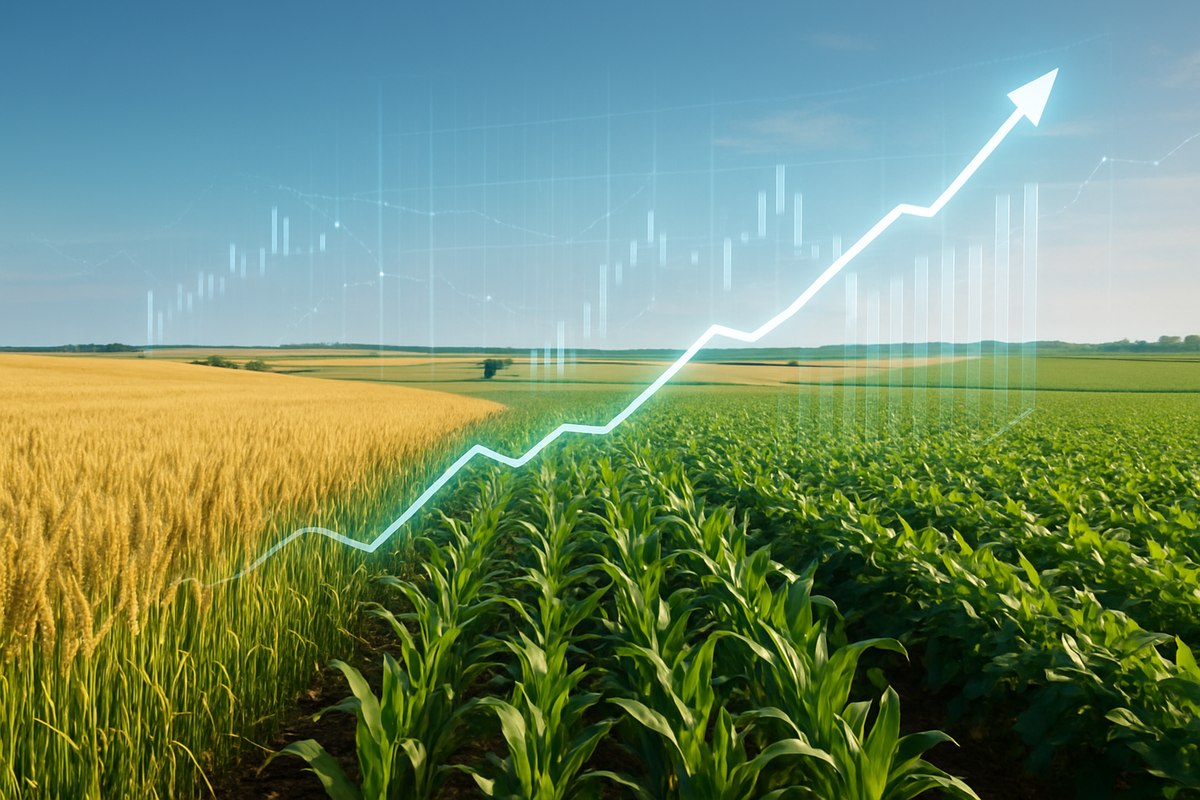Cultivating Returns: Navigating Agricultural Commodities with DBA and Diversified Strategies
By:
MarketMinute
November 24, 2025 at 14:37 PM EST

The agricultural commodities market, a bedrock of global sustenance, is increasingly drawing investor attention as a potential hedge against inflation and a powerful tool for portfolio diversification. In an era marked by geopolitical tensions, climate variability, and evolving global demand, understanding how to effectively navigate this sector is paramount. At the forefront of accessible agricultural investing is the Invesco DB Agriculture Fund (NYSEARCA: DBA), an Exchange Traded Fund that offers a convenient gateway to a basket of essential farm products. However, as market dynamics shift, investors are also exploring broader strategies to achieve truly diversified exposure within this vital sector. As of late 2025, the agricultural landscape presents a complex picture of opportunity and risk. While major food commodities like wheat, maize, rice, and soybeans have seen relative stability, tropical tree crops such as cocoa and coffee have experienced significant price surges due to supply shocks. This dichotomy underscores the nuanced nature of agricultural markets, where localized weather events and specific supply chain issues can dramatically impact individual commodity prices, even as broader trends remain stable or decline. The DBA ETF: A Window into Agricultural FuturesThe Invesco DB Agriculture Fund (NYSEARCA: DBA) stands as a prominent vehicle for investors seeking exposure to agricultural commodities without directly engaging in futures trading. Designed to track the DBIQ Diversified Agriculture Index Excess Return, DBA invests in a diversified portfolio of futures contracts across some of the most liquid agricultural products. Its holdings typically include futures on corn, soybeans, wheat, sugar, cocoa, coffee, cotton, live cattle, feeder cattle, and lean hogs. Beyond these futures, the fund also holds U.S. Treasury securities, generating income that contributes to its overall return. DBA has demonstrated significant performance in recent years, notably achieving a 116% increase from its June 2020 low to February 2025. Over the last three years, it has gained 28%, reflecting a period of heightened commodity prices. More recently, as of late 2025, the fund has shown a 2.37% increase in NAV returns over the past year, despite some short-term declines. Its expense ratio, ranging from 0.85% to 0.93%, reflects the costs associated with managing a futures-based fund. However, investors must be aware of the potential impact of "contango" – a market condition where futures prices are higher than the spot price – which can erode returns over extended periods by making the rolling over of contracts more expensive. The fund's structure as a commodity pool means it typically issues a Schedule K-1 for tax purposes, an important consideration for investors. Companies and Sectors Poised for ImpactThe fluctuating fortunes of agricultural commodities have a ripple effect across a vast ecosystem of public companies, creating both winners and losers. While DBA offers direct exposure to commodity price movements via futures, many investors gain indirect exposure through agribusiness equities. Potential Winners:
Potential Losers:
The performance of these companies is influenced not just by commodity prices but also by their operational efficiency, market share, and ability to innovate, making agribusiness equities a more complex, yet potentially rewarding, investment avenue compared to direct commodity exposure. Broader Significance: Climate, Geopolitics, and Supply ChainsThe agricultural commodity market is a nexus where global trends converge, impacting not only financial returns but also food security and geopolitical stability. The recent trends and outlook underscore several wider significances:
What Comes Next: Navigating a Dynamic FutureLooking ahead, the agricultural commodity market is poised for continued dynamism, shaped by a confluence of short-term pressures and long-term transformative trends. Investors and stakeholders must prepare for an environment characterized by both challenges and emerging opportunities. In the short term, volatility is expected to remain a defining feature. Climatic events, such as unexpected droughts or floods, will continue to trigger sudden price swings. Geopolitical developments, particularly those affecting major agricultural exporters or trade routes, could introduce rapid shifts in supply-demand balances. Farmers of major grains and oilseeds are likely to face compressed or even negative margins in 2025 due to persistently high input costs (fuel, fertilizers, interest rates), potentially impacting planting decisions and future supply. Investors should monitor weather forecasts, geopolitical headlines, and central bank interest rate decisions closely. Longer term, several strategic pivots and adaptations will be crucial. Technological advancements in agriculture (Agritech) are set to play an increasingly vital role. Innovations in precision farming, biotechnology, and sustainable practices will be essential for maximizing land use, improving yields, and building resilience against climate change. The global agriculture market is projected to grow significantly, driven by the need to feed a growing population amidst environmental constraints. This presents opportunities for companies involved in agricultural technology, sustainable farming solutions, and alternative protein sources. Global demand, particularly from emerging markets, is expected to remain strong, supporting exports of key commodities like U.S. corn and soybeans. However, the OECD-FAO Agricultural Outlook 2025-2034 projects a gradual decline in real international agricultural prices over the next decade, assuming current trends continue. This long-term outlook, however, is highly sensitive to unforeseen environmental, social, geopolitical, or economic disruptions. A weaker U.S. dollar, which is part of longer-term cyclical trends, could contribute to increased commodity price inflation over time, offering a counter-narrative to the real price decline projection. Investors should consider the potential for currency fluctuations to amplify or mitigate commodity price movements. Cultivating a Resilient Portfolio: A Comprehensive Wrap-UpThe agricultural commodities sector remains a compelling, albeit complex, arena for investors seeking diversification and a hedge against inflation. The Invesco DB Agriculture Fund (NYSEARCA: DBA) provides an accessible entry point to a broad basket of agricultural futures, offering direct exposure to price movements. However, a truly resilient investment strategy in this sector extends beyond a single ETF. Key takeaways for investors include recognizing the inherent volatility of agricultural markets, driven by unpredictable weather, geopolitical events, and supply chain disruptions. While DBA offers convenience, understanding its futures-based structure and potential for contango is crucial. For broader diversification, investors should consider a multi-pronged approach: exploring other specialized agricultural commodity ETFs, investing in agribusiness equities through ETFs like the VanEck Agribusiness ETF (NYSEARCA: MOO) or the iShares MSCI Agriculture Producers ETF (NASDAQ: VEGI), or even considering less liquid options like farmland investment for those with a long-term horizon. Moving forward, the market will be shaped by the ongoing impact of climate change, the evolution of global trade policies, and the relentless march of agricultural technology. Investors should watch for developments in sustainable farming practices, innovations in food production, and shifts in global dietary patterns. The interplay between rising input costs for farmers and sustained global demand will be a critical dynamic to monitor. Ultimately, a thoughtful, diversified approach that balances direct commodity exposure with investments in the underlying agribusiness infrastructure and innovation is likely to yield the most robust long-term results in this essential and ever-evolving market. This content is intended for informational purposes only and is not financial advice More NewsView More
Why Taiwan Semiconductor's 6.5% Dip Could Be a Smart Buy ↗
December 16, 2025
Via MarketBeat

RTX Surges to Record Highs as Defense Orders Explode ↗
December 16, 2025
Via MarketBeat
Tickers
RTX

Smart Money Is Buying Auto Suppliers, Not Car Brands ↗
December 16, 2025

Higher Beef Prices Are Here: Best Steakhouse Stocks for 2026 ↗
December 16, 2025
Via MarketBeat

AI Runs on Power—And Constellation Energy Controls the Switch ↗
December 16, 2025
Recent QuotesView More
Stock Quote API & Stock News API supplied by www.cloudquote.io
Quotes delayed at least 20 minutes. By accessing this page, you agree to the Privacy Policy and Terms Of Service.
© 2025 FinancialContent. All rights reserved.
|